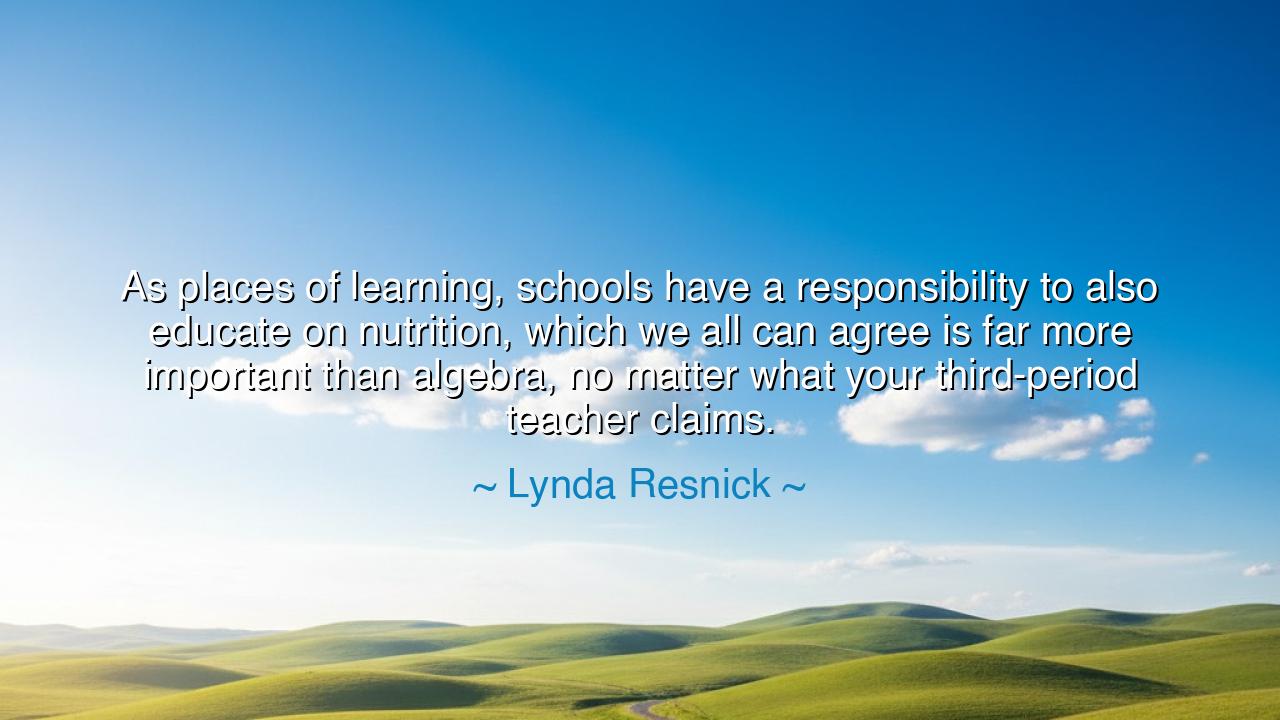
As places of learning, schools have a responsibility to also
As places of learning, schools have a responsibility to also educate on nutrition, which we all can agree is far more important than algebra, no matter what your third-period teacher claims.






Lynda Resnick, a voice both sharp and pragmatic, once declared: “As places of learning, schools have a responsibility to also educate on nutrition, which we all can agree is far more important than algebra, no matter what your third-period teacher claims.” Behind the humor of this remark is a truth of great weight, for she reminds us that while knowledge of numbers has its value, the knowledge that sustains life itself—knowledge of how to eat, how to nourish the body, how to preserve health—is of deeper importance. What use is algebra to the student whose body withers from neglect, or whose mind is clouded by hunger?
O listener, see how the ancients themselves placed nourishment at the center of their teachings. The philosophers of Greece often spoke of moderation, of temperance, of the harmony of body and spirit. Hippocrates, father of medicine, declared: “Let food be thy medicine, and medicine be thy food.” In this, he showed that to teach a young person the ways of nutrition is to arm them not only against disease but against despair. What Resnick speaks is but the echo of this wisdom—that no education is complete if it ignores the very foundation of life itself.
The story of history also bears witness to this truth. In times of famine, even the most learned nations faltered, their knowledge useless in the face of empty stomachs. Consider Ireland in the Great Famine of the 19th century: schools and books could not shield the people when the potato harvest failed. Or think of the soldiers in any war, who quickly learn that rations, not theories, determine survival. Thus, Resnick is right: while algebra may prepare one for the puzzles of commerce or engineering, nutrition prepares one for life itself.
Her words also strike at a greater lesson: that education must serve the whole person, not merely the mind. Too often, schools teach abstractions divorced from the daily needs of life. They may train the intellect to solve equations but forget to train the body to endure. They may sharpen memory but neglect wisdom in living. Yet what student does not carry food to their lips every day? What soul can live without the knowledge of balance, of sustenance, of how to care for the temple of the body? In this sense, nutrition is not only practical—it is sacred.
But let us not misunderstand her words. To elevate nutrition above algebra is not to despise mathematics, but to rank priorities with wisdom. For both knowledge of numbers and knowledge of health are useful, but one is fundamental. A child who knows nutrition will grow strong enough to learn algebra. But a child who knows algebra yet ignores nutrition will soon lack the strength to think at all. The order, therefore, is clear: life first, then learning.
The lesson for us, then, is urgent and plain. If you are a teacher, do not speak only of formulas and laws—speak also of bread, of fruit, of water, of balance. If you are a parent, do not think education begins and ends with grades—it begins with what you place upon the table. And if you are a student, do not dismiss what nourishes you as unimportant. Cherish your health, for it is the vessel of all your knowledge, the fire that fuels all your endeavors.
Therefore, children of tomorrow, let Resnick’s words sink into your hearts. Seek knowledge in books, but also seek knowledge in gardens, in kitchens, in the wisdom of simple meals. Let schools not only teach you how to calculate, but also how to live. For in the end, a well-fed body is the foundation of a sharp mind, and a nourished heart is the foundation of a noble spirit.
For truly, her quote is a reminder that the greatest equation of all is the one between body and mind. Without nutrition, the sum of all education equals nothing. With it, even the most ordinary person may achieve extraordinary things. And so, teach and learn the art of nourishment, for in it lies the beginning of wisdom.






AAdministratorAdministrator
Welcome, honored guests. Please leave a comment, we will respond soon